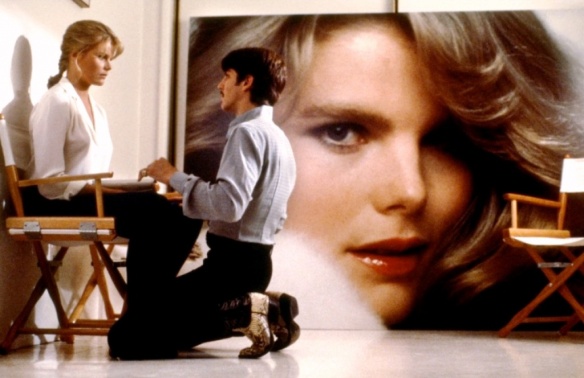
I’ve listened to all the episodes of the popular Hollywood history podcast “You Must Remeber This” without watching any of the movies that host, Karina Longworth, brings up. The past season of Dead Blondes has discussed some fascinating actresses with legendary careers and tragic deaths from icons like Marylin Monroe to forgotten starlets like Peg Entwistle. The final episode struck a cord with me though, the story of the brief stardom of Dorothy Stratten, a Playboy Playmate turned actresses who was murdered in the most horrendous of circumstances. It’s a story of exploitation, domestic abuse and the seedier side of Hollywood a la Boogie Nights. Maybe it stuck out because it plays out more like a “My Favorite Murder” episode than a “You Must Remember This”, for all you podcast nerds out there. It’s gory, graphic and salacious like many of the true crimes Karen Kilgariff and Georgia Hardstark discuss on that show and their catchphrase “fuck politeness” would have proved quite applicable to Stratten who was trapped in an abusive relationship almost out of obligation. Maybe my interest stems from it being is a Hollywood story, that I may have driven by the home where she was murdered on my way to the west side. Or most likely, that her life was adapted into a movie by Bob Fosse titled Star 80 and after I happened to watch All That Jazz last week, this biopic jumped out at me as one of Fosse’s final films. Here is where the first time a “You Must Remeber This” episode prompted me to actually dive deeper, at least in the form of Star 80.
It’s surreal watching this movie immediately after listening to Karina’s in-depth, well-researched retelling. Everything see says is played out directly on screen but with the creative flourishes of Fosse, of course. The narrative is semi-straight forward, beginning with Stratten in her hometown of British Columbia then being swept away to Hollywood and her demise but it’s not her perspective. This is a movie told through many perspectives, those who knew her, those who loved her and primarily Paul Snider, the husband that killed her. Throughout the progression, the film jumps to either talking head interviews with acquaintances, Stratten recounting her own experiences to reporters during her Playboy heyday and to Snider’s final hours as he releases his verbal and physical rage towards a dead Stratten. Fosse is bringing a documentary authenticity to the narrative, making it all the more brutal as it’s a constant reminder that this all indeed happened. Assisting that is the film’s refusal to shy away from the brutality. Movies of the 1980’s have never been the shining beacon of feminism and abusive relationships were not treated with the gravity they deserve so the fact that Snider’s manipulation and exploitation of a young woman is depicted as pure evil which is vindicating. I still was genuinely shocked when the film does major alluding to the fact that Snider raped her post-mortem which I was horrified to hear on the podcast, let alone see the set up to him doing so in a movie made in 1983.
What really sells this story aside from Fosse knowing how to construct a tension-filled arc are the performances of Eric Roberts and Mariel Hemmingway. I never thought I’d be praising music video actor Eric Roberts but his Snider is chilling. He is sleazy, self-obsessed and fiercely jealous and it scares the shit out of you. As a grown woman, of course, I finding him shady and repulsive but when he hits on a young 17-year-old Stratten at a Dairy Queen, you understand what would appeal to her. It’s a tight Eric Roberts’ bod offering her the world on a platter, a promise of getting out of Canada even if it means coaxing her into photographing nude. He has that charm that would make a young girl fall for this older man. One of the few things Karina mentions about Star 80 was that Hemmingway was criticized for treating Stratten like a bimbo and I couldn’t disagree more. Her presentation plays like the child that she is thrown into a very adult situation. At times she doesn’t know the answer to questions when we cut to those interviews but I read that as naive and overwhelmed than a dumb blonde stereotype. I like this performance because it is a reminder that she was a child, a Playmate at 19 and dead by 20. Hemmingway plays that innocence as well as the progression to the more mature woman who decides to confront Snider post break up, though it was a poor decision in itself to do so.

Karina remarks that Hugh Hefner despised his portrayal in the movie too, here played by a leathery Cliff Robertson. It’s not particularly scathing especially considering it never broaches the subject that he slept with Stratten or as stated in Peter Bogdonavich’s book “The Killing of the Unicorn” that Hefner raped Stratten during her stay at the famed mansion. The movie is more a criticism of the objectification of women perpetrated by Playboy. In the movie during one of the returned to interviews Stratten herself says “Playboy’s motto is the girl next door, they look for girls who are wholesome, fresh, young and naive” which is equating that Hefner’s company tactics are not too different from Sniders. Fosse bombards the screen with the pinup images of a semi-nude Stratten, often inferring that these are the images that Snider is obsessing over as we see them plastered all over his apartment. Even though he brought her into this world of voyeurism, he is also a part of it and with all these photos made specifically for men to gawk at, it’s no wonder he interprets her as an item made to please him and now is reluctant to let go.
It’s important that Dorothy Stratten’s story lives on as devastating as it was. The next year would show the release of the battered wife expose TV movie The Burning Bed which was a smash hit for NBC and an even more iconic portrayal maybe because the woman comes out victorious. Watching this also reminded me of the underrated Lovelace biopic of Linda Lovelace, an eerily similar case of a possessive husband who pressured wife Linda Lovelace into a pornstar career, starring in Deep Throat. These movies are so moving and effective because they’re all true stories. There’s no need to make this up because these horrid narratives occur daily and these adaptations are valuable in term of awareness of domestic violence both psychologically and physically. I was shocked that I was unaware of Stratten account until now but by means of films, podcasts and whatever medias exist in the future that she never got to experience, we can keep her memory alive.

